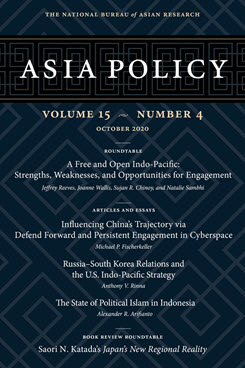Is It Time for Australia to Adopt a “Free and Open” Middle-Power Foreign Policy?
This essay examines Australia’s understanding of the concepts of the “Indo-Pacific” and “rules-based order” and analyzes how Australia pursues its geostrategic interests in the Indo-Pacific, particularly its increased emphasis on minilateralism.
EXECUTIVE SUMMARY
MAIN ARGUMENT
Australia and other regional countries confront the threat that U.S.-China tension could escalate from competition to outright confrontation. To address this challenge, Australia should adopt a more “free and open” strategic and foreign policy by partnering with other middle powers and smaller states to create a new Indo-Pacific security order that seeks to rebalance regional power dynamics. This security order would be better guided by rules than by values, but given the limitations of the existing rules-based order, Australia should recognize problems with the current rules and work to make them attractive to smaller states. This may involve middle powers compromising some of their “shared values” and making sacrifices to their national interests (narrowly defined) in service of the overriding interest in preserving regional peace and security based on rules that are seen as legitimate and respect-worthy by many states, not just the most powerful ones.
POLICY IMPLICATIONS
- Behind closed doors, middle powers are questioning whether the U.S. should continue to take the lead in securing order in the Indo-Pacific, and in fact do not necessarily trust that it is capable of doing so. Many Indo-Pacific states are wary of being caught between an activist China and an unpredictable U.S. and are reluctant to make a strategic choice.
- Over the last two decades, Australia has demonstrated its capacity as a middle power by leading interventions in Timor-Leste and the Solomon Islands, and most recently by implementing its cross-government policy to “step up” its engagement in the Pacific Islands. Australia should draw confidence from these and other efforts.
- Creating an Indo-Pacific security order negotiated and led by middle powers and small states will strain alliance relationships and strategic partnerships, and it will be challenged by Southeast Asian states’ emphasis on ASEAN centrality and the preference of regional states for nonalignment and autonomy. This suggests that creating this order will require sustained diplomatic commitment and compromise and necessarily be an iterative process.
Joanne Wallis is Professor of International Security in the Department of Politics and International Relations at the University of Adelaide (Australia). She was formerly with the Strategic and Defence Studies Centre in the College of Asia and the Pacific at the Australian National University.
About Asia Policy
Asia Policy is a peer-reviewed scholarly journal presenting policy-relevant academic research on the Asia-Pacific that draws clear and concise conclusions useful to today’s policymakers. Asia Policy is published quarterly in January, April, July, and October and accepts submissions on a rolling basis. Learn more


